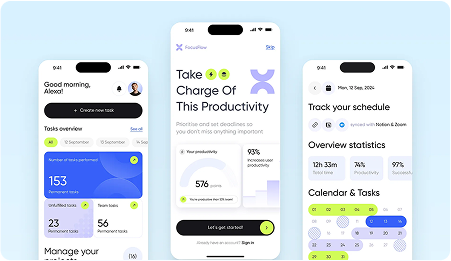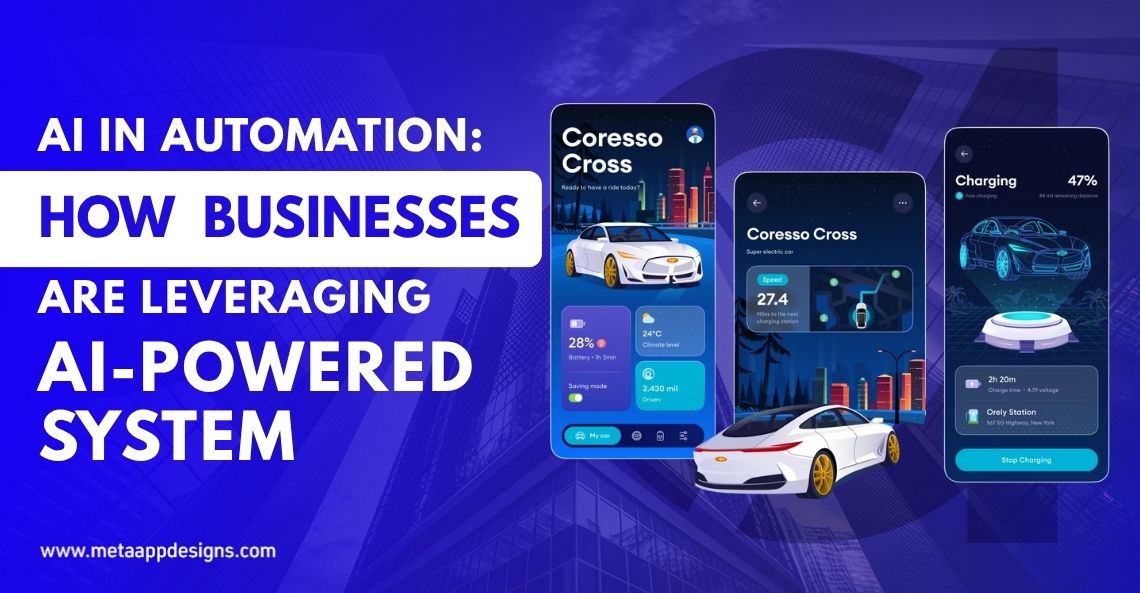
AI in Automation: How Businesses Are Leveraging AI-Powered Systems
AI is revolutionizing various sectors, especially in the automotive industry. With AI’s integration into automotive mobile app development, businesses are optimizing vehicle performance, user experience, and streamlining operations. AI enhances predictive maintenance, user personalization, and autonomous features, leading to reduced operational costs and greater customer satisfaction. This article explores how businesses are leveraging AI in the automotive mobile app sector.
Thank you for reading this post, don't forget to subscribe!In the ever-evolving automotive sector, businesses are increasingly adopting AI-powered systems to create innovative solutions that cater to the needs of both drivers and businesses. From automotive mobile app development to mobile app development for automotive, AI is playing a crucial role in enhancing vehicle features, improving user experience, and automating complex processes.
As the automotive industry faces increasing pressure to deliver smarter, more efficient solutions, AI provides a competitive edge by enabling smarter features like predictive maintenance, automated driving, and real-time vehicle tracking. By embracing AI, businesses can streamline operations, reduce operational costs, and deliver enhanced customer experiences, ultimately leading to long-term success.
How AI is Transforming Automotive Mobile App Development
Table Of Content
AI has brought significant improvements to automotive mobile app development by enabling automation, personalization, and advanced functionalities. By integrating machine learning and data analytics, AI enhances app performance, making it more intuitive and responsive to users’ needs. This transformation allows businesses to stay competitive and meet the growing demand for smart vehicles.
AI-Driven Automation in Automotive Mobile Apps
AI-powered automation is one of the key driving forces behind the success of mobile app development for automotive. Automating tasks like predictive maintenance and route optimization not only enhances the app’s functionality but also saves time, money, and resources. AI enables vehicles to handle more tasks autonomously, reducing the reliance on human intervention.
Predictive Maintenance:
AI can analyze real-time data collected from vehicles, sensors, and systems, enabling businesses to detect potential problems before they escalate. This allows companies to offer proactive maintenance services, reducing the risk of breakdowns and costly repairs.
Autonomous Driving:
One of the most groundbreaking advancements in automotive app development is the incorporation of AI-driven autonomous driving features. AI allows vehicles to process vast amounts of data from cameras, sensors, and GPS systems, enabling them to navigate roads with minimal human involvement. This technology significantly reduces the risk of accidents and improves road safety.
Benefits of AI in Automotive Mobile App Development

The integration of AI into automotive mobile app development offers multiple advantages, both for businesses and users. By incorporating AI into mobile apps, businesses can enhance app functionality, automate processes, and offer a more personalized experience to customers. These benefits include:
Improved Efficiency:
AI automates repetitive tasks, saving time and allowing employees to focus on more critical aspects of the business. For example, AI can automatically track vehicle health, schedule maintenance, and optimize driving routes.
Cost Savings:
With AI handling routine tasks, businesses can reduce the need for manual labor, lower maintenance costs, and minimize human errors, all contributing to greater cost savings in the long run.
Personalized User Experience:
AI-powered apps can learn from user behavior, tailoring the app experience to individual preferences. This results in more engaging interactions, whether it’s offering personalized recommendations or adjusting the app’s interface according to user behavior.
Real-Time Analytics:
AI in automotive apps can analyze data in real-time, allowing businesses to make informed decisions quickly. For example, AI can assess traffic patterns and optimize vehicle routes for efficiency, ultimately saving time and resources.
The Role of AI in Automotive Application Development
AI is integral not only to mobile apps but also to the overall automotive application development process. By incorporating machine learning and data analytics, businesses can develop apps that help optimize various aspects of vehicle systems, including fleet management, safety features, and performance monitoring. AI is driving innovations in the automotive sector.
The scope of automotive application development extends beyond just mobile apps. AI is embedded in various aspects of vehicle systems, including in-car navigation, advanced driver-assistance systems (ADAS), and predictive analytics. As AI technology advances, businesses are able to offer even more innovative solutions, enhancing the overall driving experience.
AI and Fleet Management
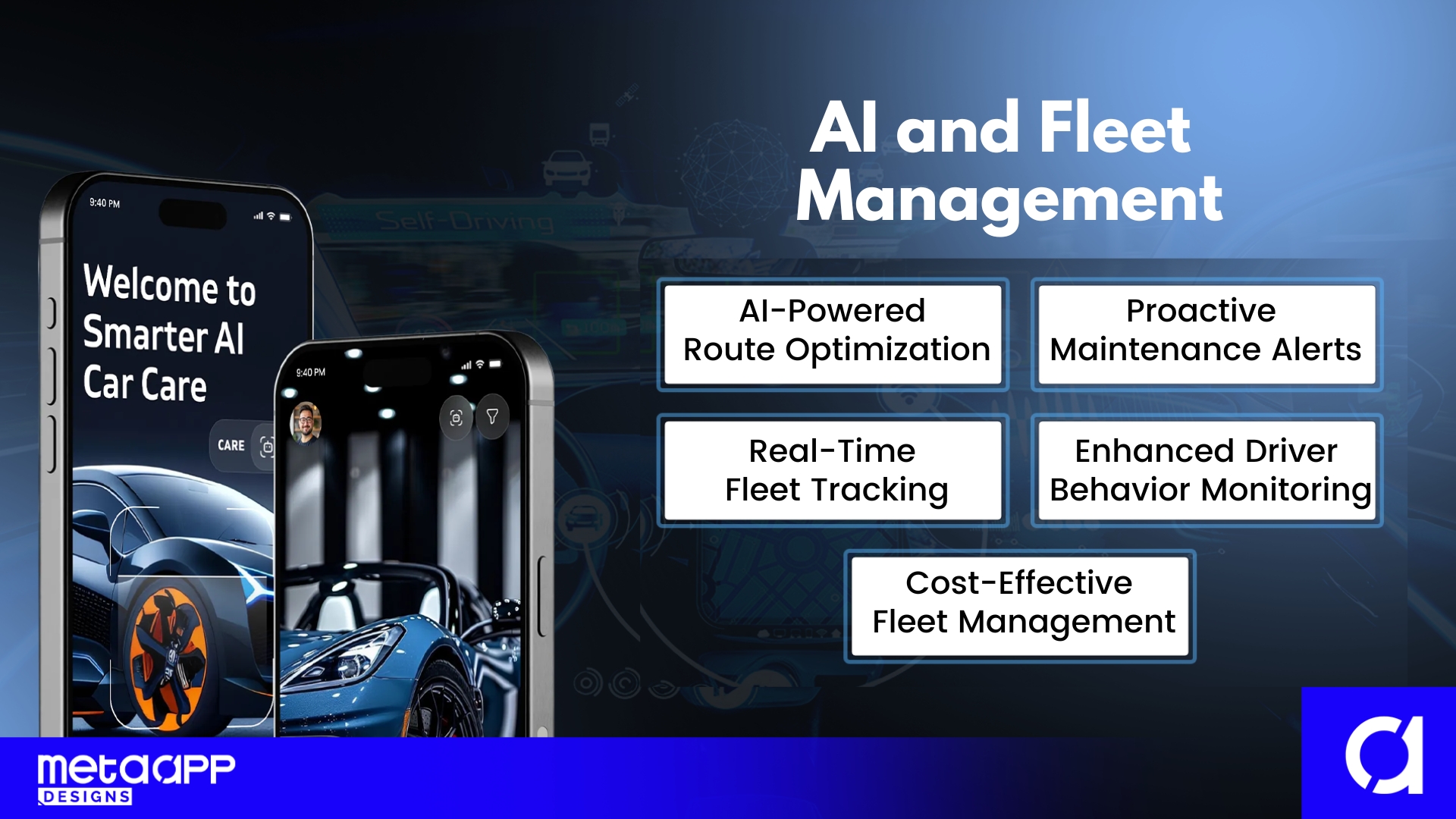
For businesses managing large fleets, the integration of AI into automotive application development can help streamline operations and improve overall efficiency. AI-driven platforms offer solutions like route optimization, maintenance scheduling, and real-time vehicle tracking, reducing the likelihood of human errors and increasing fleet productivity.
1. AI-Powered Route Optimization
AI analyzes real-time traffic data, identifying the most efficient routes for fleet vehicles. This helps businesses save on fuel, reduce travel time, and avoid traffic delays. By continuously updating route recommendations based on current conditions, AI ensures that drivers take the best paths, ultimately improving operational efficiency and reducing costs.
2. Proactive Maintenance Alerts
AI systems track vehicle health and provide real-time insights into potential maintenance issues. By monitoring key components such as engine performance and tire condition, AI can send proactive alerts for maintenance before problems arise. This minimizes unexpected breakdowns, ensures smoother fleet operations, and extends the lifespan of vehicles, ultimately lowering repair costs.
3. Real-Time Fleet Tracking
AI allows businesses to monitor their fleet in real-time. With GPS and sensor data, businesses can track vehicle location, speed, and performance throughout the day. This feature helps improve decision-making by providing instant access to operational data, allowing for adjustments in routing, staffing, and delivery times to enhance overall fleet productivity.
4. Enhanced Driver Behavior Monitoring
AI can assess driver performance based on real-time data, such as speed, braking habits, and fuel usage. This information helps businesses identify areas where drivers can improve, whether it’s reducing excessive speed or minimizing fuel consumption. By improving driver behavior, businesses can boost safety, reduce accidents, and lower operational costs.
5. Cost-Effective Fleet Management
By automating routine tasks like maintenance scheduling and route planning, AI significantly reduces the time and effort required for fleet management. Businesses can ensure that vehicles are always in optimal condition and that operations run smoothly. This efficiency leads to lower management costs, better resource allocation, and improved profitability for businesses with large fleets.
Data Analytics for Enhanced Decision Making
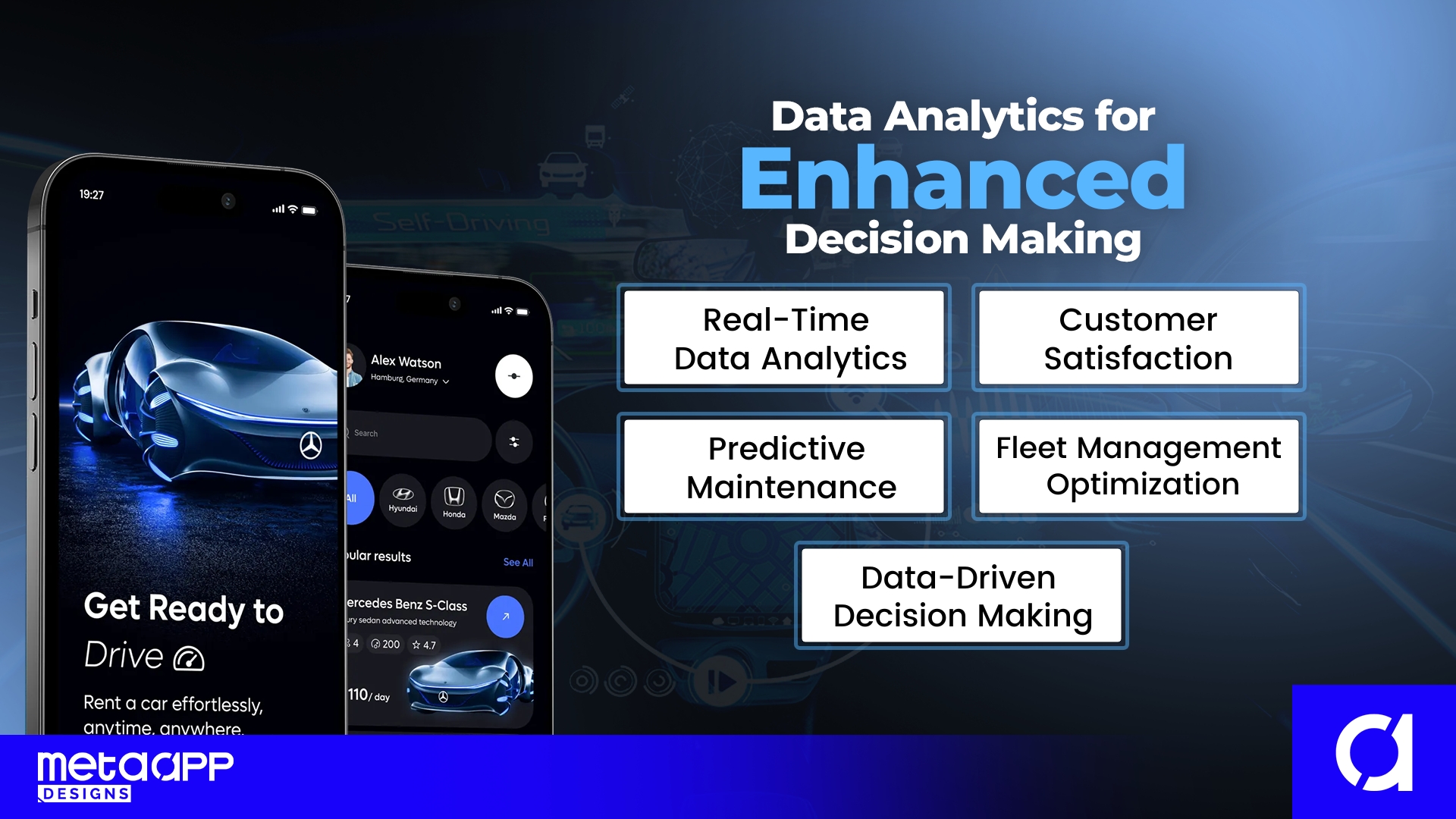
AI plays a significant role in mobile app development for automotive by enabling real-time data analysis. By processing large datasets collected from vehicle sensors, GPS systems, and user interactions, businesses can make data-driven decisions to improve vehicle performance, customer satisfaction, and service delivery.
1. Real-Time Data Analytics
Real-time data analytics allows businesses to monitor vehicle performance and customer interactions instantly. This helps businesses react quickly to unexpected changes, like optimizing routes for efficiency or addressing maintenance issues before they become significant problems. By using AI-powered systems, businesses can stay ahead of potential challenges and improve overall operational efficiency.
2. Customer Satisfaction with AI Insights
AI-driven analytics can provide deep insights into customer behavior and preferences, enabling businesses to offer personalized services. By analyzing data from user interactions, AI can suggest improvements to the app experience or provide tailored recommendations, ensuring that customers feel understood and valued. This leads to higher satisfaction and better retention rates.
3. Predictive Maintenance
AI’s predictive maintenance capabilities analyze historical vehicle data to predict when maintenance will be needed. By identifying trends, such as frequent issues with specific vehicle parts or equipment, businesses can proactively schedule repairs or replacements, reducing unplanned downtime and ensuring smoother operations. This results in cost savings and greater vehicle longevity.
4. Fleet Management Optimization
AI analytics is crucial for managing large fleets. By continuously analyzing vehicle performance, route efficiency, and driver behavior, AI helps businesses optimize their fleet operations. This not only reduces fuel costs and delays but also improves fleet management by providing actionable insights, ensuring that businesses can make real-time decisions to boost productivity.
5. Data-Driven Decision Making
AI systems analyze historical data to predict future trends and behaviors. For businesses, this means being able to anticipate everything from traffic patterns to service needs, allowing for better strategic planning. By using these insights, businesses can reduce risks, improve forecasting accuracy, and make smarter decisions that drive operational success and growth.
Why Businesses Should Invest in AI for Automotive App Development

AI-powered systems are essential for modern android automotive app development. Businesses that adopt AI in their mobile app development for automotive gain a competitive edge by offering innovative features like autonomous driving, predictive maintenance, and personalized services. These developments not only enhance user experience but also reduce operational costs.
As the demand for smarter vehicles and more innovative mobile apps grows, businesses that invest in AI will be well-positioned to lead the market. By integrating AI-powered systems, businesses can improve vehicle performance, enhance customer engagement, and reduce costs, all while staying ahead of the competition.
Investing in AI also opens the door to new opportunities, such as the development of autonomous driving capabilities and advanced safety features. These innovations are likely to become essential components of the future automotive landscape, making AI an indispensable tool for businesses looking to stay ahead.
Key Advantages of AI-Powered Systems in the Automotive Industry
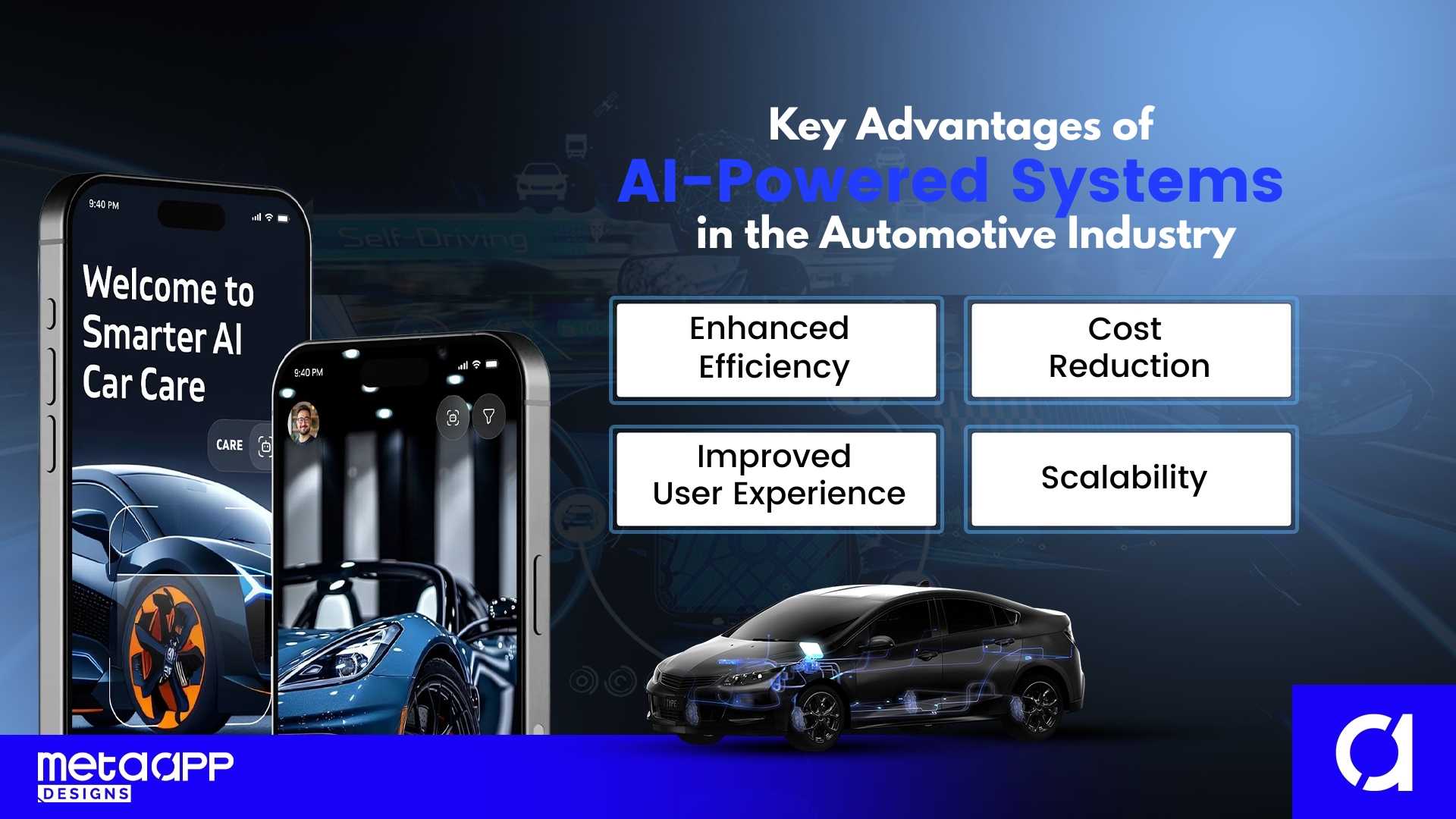
Businesses in the automotive sector are quickly adopting AI-powered systems to improve efficiency and reduce costs. The benefits of AI include automated processes, enhanced user experiences, and the ability to predict and prevent issues. AI is key to the future of automotive technology, from predictive maintenance to real-time data analysis.
Enhanced Efficiency
AI optimizes various aspects of automotive app development, from real-time traffic management to autonomous vehicle navigation. By automating these processes, businesses can significantly reduce manual intervention, increasing operational efficiency and lowering costs.
Cost Reduction
AI-powered systems can automate many tasks, such as vehicle diagnostics, maintenance scheduling, and route optimization. These efficiencies reduce operational costs, allowing businesses to allocate resources more effectively and improve profit margins.
Improved User Experience
AI personalizes mobile app features, allowing users to enjoy a more tailored, intuitive experience. From recommending routes based on driving habits to providing real-time maintenance alerts, AI ensures that customers receive relevant and engaging content, ultimately improving satisfaction.
Scalability
AI systems in automotive apps are designed to scale with the business. Whether the company is managing a small fleet or a large-scale operation, AI can adjust to meet the growing needs of the business without compromising service quality.
Conclusion
AI-powered systems are shaping the future of automotive mobile app development. By leveraging AI, businesses can optimize operations, enhance customer satisfaction, and stay competitive in a rapidly evolving market. From autonomous driving to predictive maintenance, AI continues to transform the automotive industry.
Businesses that invest in AI-driven automotive mobile app development solutions stand to gain a significant competitive advantage. At Meta App Designs, companies can leverage AI technology to develop innovative and efficient automotive applications that meet the needs of today’s tech-savvy consumers.
Frequently Asked Questions
Automotive mobile app development involves creating mobile applications specifically designed for the automotive industry. These apps may offer features such as vehicle tracking, predictive maintenance, and autonomous driving capabilities, making them highly relevant to today’s automotive businesses.
AI enhances mobile app development for automotive by enabling features such as predictive maintenance, autonomous driving, and personalized user experiences. AI-driven apps can automate processes, improve vehicle performance, and streamline operations, ultimately leading to better customer experiences and cost savings.
Android automotive app development integrates AI technology into mobile applications, enabling businesses to develop smarter, more efficient apps with features like real-time data analysis, personalized services, and autonomous vehicle capabilities.
Automotive app development enables businesses to offer innovative solutions that improve operational efficiency, enhance customer engagement, and reduce costs through automation and AI-driven features. These apps help businesses provide cutting-edge services that meet the growing demand for smarter vehicles.
Investing in AI-powered automotive mobile apps enables businesses to stay competitive in the market by offering advanced features like autonomous driving, predictive maintenance, and personalized services.
- android automotive app development
- automotive mobile app development
- mobile app development for automotive
Table Of Content






